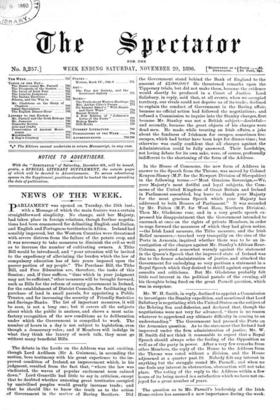The debate in the Lords on the Address was not
exciting, though Lord Ardilaun (Sir A. Guinness), in seconding the motion, bore testimony with his great experience to the im- proved condition of Ireland, an improvement which, in his judgment, resulted from the fact that, "where the law was vindicated, the waves of popular excitement soon calmed down." Lord Granville had little to say in criticism, except that he doubted whether annexing great territories occupied by uncivilised peoples would greatly increase trade; and that he should like to know the truth as to the action of Government in the matter of Baring Brothers. Did
the Government stand behind the Bank of England to the amount of £2,000,000 P He threatened remarks upon the Tipperary trials, but did not make them, because the evidence would shortly be produced in a Court of Justice. Lord Salisbury, in reply, said that, at all events, when we occupied territory, our rivals could not deprive us of its trade; declined to explain the conduct of Government in the Baring affair, because no official action bad followed the negotiations ; and refused a Commission to inquire into the Stanley charges, first because Mr. Stanley was not a British subject—doubtful- and secondly, because the great objects of his charges were dead men. He made, while treating on Irish affairs, a joke about the fondness of Irishmen for escapes, sometimes fire. escapes, which had better have been kept for dinner-time ; but otherwise was easily confident that all charges against the Administration could be fully answered. Their. Lordship; not loving debate for its own sake, were, of course, profoundly indifferent to the shortening of the form of the Address.










































